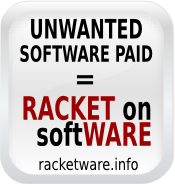French Court of Cassation threatens bundled software

In France, like in many other countries, when a consumer buys a computer, he is forced to pay for the licence of the pre-installed operating system and other software. However, consumers may not intend to use them, sometimes because they already have, or want to have, another version of Windows, sometimes because they want another operating system and other software.
In March 2008, a Guide (in French) was published by Racketware, a workgroup of the Association of French-speaking Free Software Users (AFUL). Since March 2008, about two dozens of consumers have sued the manufacturer or the vendor in court on this issue in France.
Today, Racketware is proud to announce that the Cour de Cassation (which, in France, among the four highest jurisdictions, is the one relevant for this type of cases), has issued two rulings concerning this question.
Nov. 2010: French Court of Cassation issues two rulings concerning sales of computer hardware and software
The Court of Cassation decided and published a first ruling (Pétrus vs. Lenovo) on November 15th, 2010. It clarified the situation concerning bundled hardware and software sales. A judgement issued by a juridiction de proximité (Small claims court) in Tarascon in November 2008 was overturned: the judge had ignored a European directive dealing with unfair commercial practice.
Another ruling was decided by the Court of Cassation on the very same day, even though it was not published by the Court. This Guerby vs. Darty ruling is very similar to the Pétrus vs. Lenovo one. There is an important subtlety, however, that extends the jurisprudence by the Court of Cassation.
Two judgements overturned: one for the computer manufacturer, the other one for the retailer
The situations at the origin of both overturned judgements are very similar: these consumers were particularly tired of the impossibility to buy the computer hardware they desired without paying for software that they did not request nor intended to use. After the purchase, they requested the refund of the corresponding licences, which was refused. Each consumer then took the case to court. In the Pétrus vs. Lenovo case, the consumer turned against the computer manufacturer, while in the Guerby vs. Darty case, the consumer chose to attack the retailer. In both cases, after their arguments had been turned down by the judge without any firm ground, the consumers decided to go to the Court of Cassation. The corresponding decisions, issued on the same day, overturn the original judgements by the juridictions de proximité.
Same reason, even punishment...
In the Pétrus vs. Lenovo case, the Court of Cassation overturned the initial judgement for default of legal ground, because the judge had omitted to interpret the French law in the light of the dispositions concerning unfair commercial practices in the 2005/29/CE European directive.
In the Guerby vs. Darty case, the Court extends its jurisprudence to computer hardware retailers. Thus, it emphasizes that bundled computer hardware and software sales must be examined through the criteria defined by this directive, equally in consumer vs. manufacturer and in consumer vs. retailer disputes.
A significant second victory
This is a second victory in the battle led by workgroup Racketware of AFUL against forced sales of software with computer hardware. After this second ruling by the Court of Cassation, retailers of computer hardware, who are generally very inclined to reject the responsibility of such bundled sales practice onto manufacturers, will tend to become more concerned.
Furthermore, through this ruling, the Court of Cassation injects strong momentum into many similar small claims judgements yet to come.
These two rulings, which highlight some principles in European directive 2005/29/CE, should also encourage European citizens to take similar cases to court as well. The Racketware team will be happy to answer any questions.
Further reading
Legal analyses (in French) by Maître Frédéric Cuif, advocate in Poitiers, on the Guerby vs. Darty case, the Pétrus vs. Lenovo case and the European ruling on April 23th 2009. Possible use of some items of the 2005/29/CE directive are mentioned.
See also the French version of this announcement.


